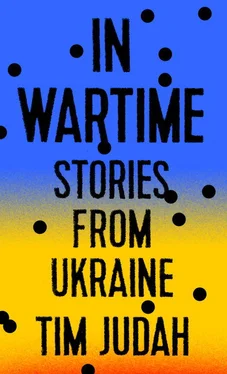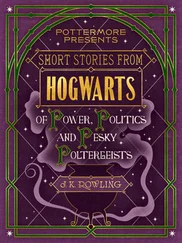Tim Judah
IN WARTIME
STORIES FROM UKRAINE

Holodomor commemoration. Lviv, November 2014.


Detail left

Detail right
INTRODUCTION
Dying for Ukraine

Dead Ukrainian soldier hanging from power cables. Novokaterinivka, September 2014.
This is what I saw: the bloated corpse of a man, hanging folded over the high power cables in the eastern village of Novokaterinivka. He had been part of the Ukrainian retreat from Ilovaysk at the end of August 2014. When a rebel or Russian missile hit his armored vehicle and the ammunition inside it exploded, the top of it peeled off like the lid of a sardine tin. His body was flung into the air and then caught on the wire. In the wreckage there were the charred remains of another young soldier and, by the blasted top of the vehicle, lying on the road, the blackened torso of a third man. His arm was held over his head. The body on the wire, which had completely escaped the flames, looked waxy and somehow unreal, swelling and gleaming slightly in the late summer sun. His trousers had come off, dangling from his feet, his shirt and jacket hung down over his head. It was a symbol of defeat—or of victory, depending on which side of the war you were on.
I tried to find his name, but failed. Quite possibly the dead soldier and I came close again a few months later in Lviv. Maybe he was buried here, almost 1,300 kilometers to the west, close to the Polish border in the grand Lychakiv cemetery. Much of the history of Lviv and western Ukraine is here. Literally. In November, the leaves are moldering in the damp and you can stroll past bronze men with bushily confident nineteenth-century mustaches and weeping, lichen-stained angels. Every tomb tells a story, but even more than that, every memorial, or at least the more recent ones, is still fighting the history wars for those who fell for their cause. Over here are the men of the Austro-Hungarian army who died fighting the Russians in the First World War. Up here are the Poles who died fighting the Ukrainians when it was over, and next to them are their Ukrainian enemies. Here are the people murdered by the Soviets in 1941. Here are the Soviets who died fighting the Nazis. Here is the monument to the local Ukrainian SS division. Here are the other Ukrainians who fought with the Nazis, against them, against the Poles again and then against the Soviets.
And now the new sections for a new generation: here are the heroes of Lviv who were killed fighting the regime of President Viktor Yanukovych during the Maidan revolution of 2014. And here, beginning a few months later, are eighteen graves piled high with wreaths and draped with yellow and sky blue Ukrainian flags. In the framed photos on top of the graves you can see how young were some of these men who died in the war in the east, or maybe some looked so young because the last proper portrait of them was taken when they graduated from school?
Olha Vaskalo was fussing around the grave of her son Roman, who was twenty-five, as though he was in the hospital and not six feet below her. He had joined up in May 2014 and was killed in July. He had been in Lugansk. He was injured in the leg with shrapnel from a Grad missile. “Was it worth it?” I asked. She looked confused, uncertain what to say. Then she replied: “The children are dying for nothing.” He had a two-year-old son and worked on the railways. An old lady called Nadya, who had been listening, joined in. “Only our boys are fighting,” she said, meaning boys from Lviv and the west of the country. “The rest are sitting around drinking vodka. As always!” It is untrue. But it is true that across Ukraine everyone believes that they are suffering more, contributing more and doing more while everyone else is doing nothing.
A few graves away was Ruslana Holets. “They had nothing to defend themselves with,” she said quietly. “They were just left there.” She talked to her son on Monday evening and he died on Tuesday. “They were surrounded and our army abandoned them. There were mines all around them. He said, ‘All’s fine, we have food,’ but it was not true.” It was drizzling, gray and cold. This is what many believe, that there was treachery, or that the top brass does not care what happens to its men on the ground. It is easier to believe this than that your son might have died simply due to incompetence or a lack of coordination in a military bled dry by more than two decades of corruption and theft of its resources.
On the other side of the line, in Donetsk, one of the two main rebel-held cities, is Vladimir Antyufeyev, a sixty-three-year-old Russian, who led a unit of Soviet special operations troops in the dying days of Soviet Latvia. For many years he was wanted by the Latvians for his role in an attack on their Ministry of Interior in 1991 in which five died. By his own account he escaped two hours before the Latvian “fascists” came to arrest him in 1991. Then he was sent to Moldova, or more precisely Transnistria. On the left bank of the Dniester River, anti-Moldovan activists declared its secession from Moldova in 1991 and then, with Russian military help, this was consolidated in a brief war against Moldovan “fascists” in 1992. Here Antyufeyev adopted the pseudonym of Major-General Vadim Shevtsov and set up and ran the breakaway statelet’s fearsome little KGB for twenty years. This oversees the territory’s smuggling empire, its main source of cash apart from its subsidies from Moscow. In 2012 he was ousted and charged with abuse of power and corruption. He also helped in security operations in Abkhazia and South Ossetia, the breakaway regions of Georgia controlled by Russia. In 2014, in the wake of the Maidan revolution, he went to Crimea to prepare for it to be snapped off from Ukraine. Now he was going from strength to strength. In July he was setting up the security services of the Donetsk People’s Republic, or DNR to use its Russian acronym, which had just declared independence from Ukraine’s “fascists.” He sat in a large conference room in the city’s central, Soviet-era regional administration building which the rebels had taken over. He was balding with a tidy gray, close-cropped goatee beard. He wore a neat white shirt and a black suit and black tie. Nearby, cradling a Kalashnikov, sat a podgy old man who looked as if he must have had trouble puffing all the way up to the eleventh floor of this building, because the lifts were not working. Also present, a younger, more serious-looking guard with an ever so fashionable, just slightly cocked Cossack-style black hat.
Antyufeyev—he had returned to his old self having shed his Major-General Shevtsov personality—spoke with the assurance of a man who knew that at long, long last he was back on the right side of history. He was back, after years in exile in dull, provincial Transnistria, war-wrecked Abkhazia and South Ossetia, which is little more than a village connected to Russia by a tunnel. At last Russia was back and he had magically, for no one knew how, become a “deputy prime minister” of the DNR and was, at least for a few months until he vanished into obscurity again, at the center of things, where he should always have been. The tone was smug. Ukraine had squandered its chances. It was not disintegrating, he said, as opposed to, well, “disassembling.”
Читать дальше


















